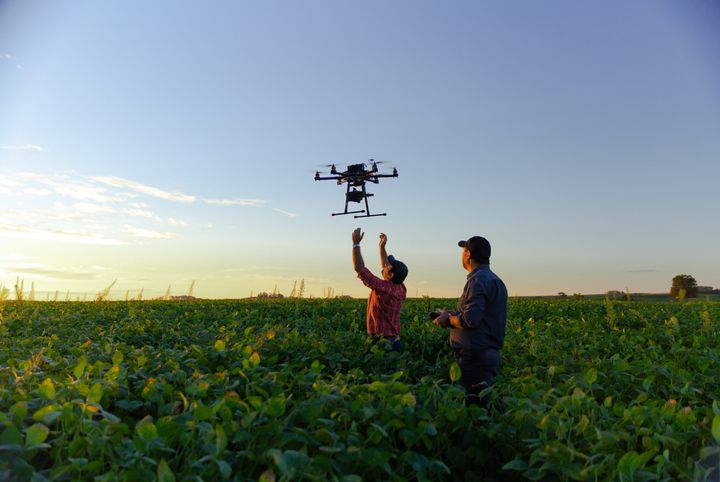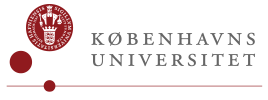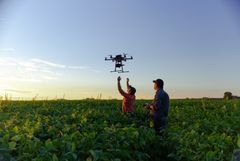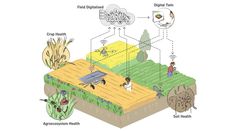Robots, monitoring and healthy ecosystems could halve pesticide use without hurting productivity
26.2.2024 13:04:24 CET | Københavns Universitet | Press release
Smarter crop farming that combats weeds, insect pests and plant diseases by integrating modern technologies like AI-based monitoring, robotics, and next-generation biotechnology with healthy and resilient agricultural ecosystems: One Crop Health, a new research collaboration based at University of Copenhagen aims to reduce the use of pesticides by developing a sustainable agriculture for the future.

In keeping with the age-old saying: ‘prevention is better than a cure’ more sustainable approaches should await the farmers of the future without compromising their productivity, as envisioned by the researchers leading the recently launched One Crop Health research project.
Backed by DKK 60 million (€8.05M) from Novo Nordisk, researchers from University of Copenhagen will gather knowledge over the next six years to develop smarter agriculture that is both sustainable and able to produce enough food for the world's growing population in a collaboration with researchers from Aarhus University and Rothamsted Research in the UK.
For many years, growers have relied on pesticides to control disease, pests and weeds, which lead to worldwide losses of one-third of crop yield. At the same time, estimates show that we will need 60% more food than today by 2050.
However, pesticides also threaten health, nature and biodiversity, and there is increasing pressure from society and politicians to limit their use. Recently the desire for healthier and more sustainable crops resulted in EU policy plans for a 50% reduction in pesticides by 2030. These plans have now been set on pause after being challenged by farmers concerned that pesticide reduction could make farming unviable by hurting productivity.
So, can growers halve their use of pesticides without the profession becoming unproductive and the world running out of food or? This is the central question that One Crop Health seeks to answer.
Making pesticide reduction profitable for farmers
“The political controversy, farmer and industry concern, and the uncertainty over regulation clearly shows that more research is needed to enable this transition. Most farmers actually want to use less pesticides, but there is a need for research that demonstrates how this is possible whilst maintaining healthy, high-yielding, and profitable crops. The One Crop Health project aims to bridge the gap by developing research, which places the drive to reduce pesticide use on a scientific foundation that will ultimately help farmers make the rational decision to help reduce pesticide use,” says Professor Paul Neve from the Department of Plant and Environmental Sciences
According to the project's lead researcher, making a viable transition is possible though, using a more holistic approach to farming.
"Generally the focus needs to move away from solving individual problems by way of a few blunt tools like pesticides. Oftentimes, this approach creates new problems elsewhere, which then also need to be addressed. Planting fields densely to avoid weeds is another example of this lack of oversight, where the misguided solution ends up creating the optimal conditions for fungi and diseases instead. We need to get better at understanding entire ecosystems and then make use of all of the modern tools available," says Professor Paul Neve.
"If we can create healthy ecosystems that will reduce the numbers of pests, weed and diseases, it will simply reduce the need for spraying. We can largely replace the remaining need with other tools, for example, AI-based monitoring and modelling can help to inform where and when pests need to be controlled and new solutions such as bio-pesticides can be used to achieve that," he says.
Natural defenses have been replaced with chemicals
The resilience that results from healthy ecosystems can reduce challenges that are currently solved by means like pesticides.
"Today’s crops are characterized by attempts to make crop production more efficient for thousands of years. In the process, many crops have lost their natural defences against pests, weeds and diseases," explains Paul Neve.
According to the researcher, tomorrow’s growers can get better at protecting their plants by looking at how things are done in nature. Here, helpful microorganisms like bacteria and fungi protect against diseases, and healthy crops are more competitive against weeds. At the same time, pests that threaten crops will be better controlled by their natural enemies.
"If you think of the field as an entire ecosystem that needs to thrive – hence the name One Crop Health, we believe you get a preventive overall effect. At the same time, modern knowledge and technology can, for example, change the basic need for pesticides. Whereas entire fields are sprayed today, drone surveillance will allow us to only target where weeds are a threat to the crop, or not at all, and let robots do the work instead," says the professor.
100 farmers to help researchers
“Part of the project is about working with farmers, using their fields to discover smart solutions, so future agriculture can be based on the best possible knowledge," says Paul Neve.
In collaboration with 100 farms, and distributed equally across Denmark and England, they will begin by collecting data from scratch.
"We begin by asking farmers about their current challenges, how they will try to solve them and about what works and what doesn’t. To this knowledge bank, we will add our professional knowledge of ecosystems, modern technologies and methods, and then the goal when the six years have passed is to be able to give a lot of knowledge and concrete methods back to farmers," says Paul Neve.
Drone data and models will predict field needs
The final prong in the effort to achieve a holistic understanding comes from broad knowledge and modern technologies that provide access.
In an interdisciplinary collaboration with the Department of Computer Science at University of Copenhagen, a group of computer scientists will translate information from surveillance with modern technologies such as drones, and on that basis design so-called digital twins of farmer’s fields.
"They will provide a kind of model that can predict how fields will behave, the needs that are just around the corner and how different solutions will affect the fields," says Paul Neve.
In the second half of the six-year project, 11 Ph.D. students will develop knowledge about specific solutions within their respective focus areas.
"When the six years have passed, it is important for us that we have integrated data and new tools in a holistic way, providing farmers with concrete methods that they can use to solve their challenges in everyday life more sustainably without compromising productivity," Paul Neve concludes.
Keywords
Contacts
Paul NeveProfessorSection for Crop Sciences, Department of Plant and Environmental Sciences, University of Copenhagen
Tel:+45 35 32 21 61pbneve@plen.ku.dkKristian Bjørn-HansenJournalist and Press ContactFaculty of Science, Copenhagen University
Tel:+45 93516002kbh@science.ku.dkImages
Links
ABOUT THE FACULTY OF SCIENCE
The Faculty of Science at the University of Copenhagen – or SCIENCE – is Denmark's largest science research and education institution.
The Faculty's most important task is to contribute to solving the major challenges facing the rapidly changing world with increased pressure on, among other things, natural resources and significant climate change, both nationally and globally.
Subscribe to releases from Københavns Universitet
Subscribe to all the latest releases from Københavns Universitet by registering your e-mail address below. You can unsubscribe at any time.
Latest releases from Københavns Universitet
Frygt for karrieren driver – og vælter – brutale regimer20.1.2026 20:30:00 CET | Pressemeddelelse
Ny forskning viser, at ambitioner og angst kan forvandle ’almindelige mænd’ til et regimes hensynsløse håndlangere – eller dets omvæltere. Det er nemlig karrierepres – ikke ideologi – der får militærofficerer til at beskytte eller vælte diktatorer.
KU-forskere indtager forsiden af Nature: Løser mysteriet om universets røde prikker14.1.2026 17:00:00 CET | Pressemeddelelse
Siden James Webb-teleskopet gik i luften, har røde prikker på billederne forundret videnskabsfolk verden over. Nu kan forskere fra Københavns Universitet forklare de gådefulde prikker, som gemmer på de voldsomste kræfter i universet skjult i en puppe af gas. Opdagelsen er udgivet i Nature i dag (onsdag d. 14/1.)
Ny forening sikrer stærkt fundament under Innovation District Copenhagen14.1.2026 08:00:00 CET | Pressemeddelelse
Innovation District Copenhagen skal være et internationalt kraftcenter for innovation og skal samle forskere, klinikere, iværksættere og virksomheder, så der udvikles flere nye løsninger og flere virksomheder inden for bl.a. life science og kvanteteknologi. En bred partnerkreds stifter nu en forening, der skal understøtte en langsigtet og bæredygtig udvikling af distriktet. Foreningen stiftes af repræsentanter fra stat, kommune, forskningsinstitutioner, sundhedssektor, erhvervsliv, finans, fonde og innovationsaktører. Med i stifterkredsen er Københavns Universitet
Danish chemist's invention could make counterfeiting a thing of the past8.1.2026 09:40:09 CET | Pressemeddelelse
Every year, companies lose billions of kroner when goods are copied or illegally resold. But a new digital and legally binding fingerprint developed at the University of Copenhagen makes products impossible to counterfeit. Royal Copenhagen is among the first brands in the world to use the solution.
Groundbreaking Mapping: How Many Ghost Particles All the Milky Way’s Stars Send Towards Earth8.1.2026 08:23:24 CET | Press release
Every second, a trillion of the elusive ghost particles, the neutrinos, pass straight through your body. Now, astrophysicists from the University of Copenhagen have mapped how many ghost particles all the stars in the Milky Way send towards Earth, and where in the galaxy they originate. This new map could help us track down these mysterious particles and unlock knowledge about our Galaxy that has so far been out of reach.
In our pressroom you can read all our latest releases, find our press contacts, images, documents and other relevant information about us.
Visit our pressroom

